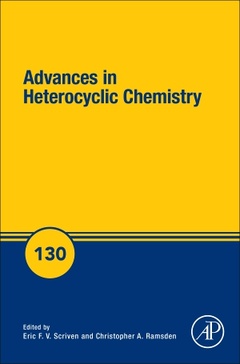Advances in Heterocyclic Chemistry
Directeurs de Collection : Scriven Eric F.V., Ramsden Christopher A.

Advances in Heterocyclic Chemistry, Volume 130, the latest release in this definitive series, provides a comprehensive review that combines descriptive synthetic chemistry and mechanistic insights to yield an understanding of how chemistry drives the preparation and useful properties of heterocyclic compounds. New chapters in this release include Recent Developments in the Radiolabeling of Heterocyclic Rings, Chemistry of Azetidines, Tricyclic Fused Bithiophenes and Related Analogues: Important Building Blocks for Conjugated Materials, Application of Electrochemical Methods in the Synthesis of Heterocyclic Compounds and Elucidation of Their Properties, Organometallic Complexes of Chelating Azines, and more.
1. Advances in synthesis and chemistry of azetidines Girija S. Singh 2. Tricyclic fused bithiophenes and related analogues: Important building blocks for conjugated materials Seth C. Rasmussen, Eric J. Uzelac and Evan W. Culver 3. Application of organic azides in the synthesis of heterocyclic systems Branko Stanovnik 4. Ring-opening reactions of 2-imidazolines and their applications Alexander Sapegin and Mikhail Krasavin 5. Cascade aza-Prins reactions Lenka Cuprova and Adrian P. Dobbs 6. Arsoles, stiboles, and bismoles Viktor Milata 7. Organometallic complexes of functionalized chelating azines Alexander P. Sadimenko
Graduate students and research workers in academic and industrial laboratories, organic chemists, polymer chemists and biological scientists
Chris Ramsden was born in Manchester, UK in 1946. He is a graduate of Sheffield University and received his PhD in 1970 for a thesis entitled ‘Meso-ionic Compounds’ (W. D. Ollis) and a DSc in 1990. Subsequently he was a Robert A. Welch Postdoctoral Fellow at the University of Texas (with M. J. S. Dewar)(1971-3), working on the development and application of semi-empirical MO methods, and an ICI Postdoctoral Fellow at the University of East Anglia (with A. R. Katritzky)(1973-6), working on the synthesis of novel heterocycles. In 1976 he moved to the pharmaceutical industry and was Head of Medicinal Chemistry (1986-1992) at Rhone-Poulenc, London. He moved to Keele University as Professor of Organic Chemistry in 1992, where he is now Emeritus Professor. His research interests include the structure and preparation of novel heterocycles, three-centre bonding in the context of the chemistry of betaines and hypervalent species, and the properties of the enzyme tyrosinase and related ortho-quinone chemistry. He was an Editor-in-Chief of ‘Comprehensive Heterocyclic Chemistry III’ and a co-author of ‘The Handbook of He
- Considered the definitive serial in the field of heterocyclic chemistry
- Serves as the go-to reference for organic chemists, polymer chemists and many biological scientists
- Provides the latest comprehensive reviews as written by established authorities in the field
- Combines descriptive synthetic chemistry and mechanistic insights to enhance understanding on how chemistry drives the preparation and useful properties of heterocyclic compounds
Date de parution : 01-2020
Ouvrage de 380 p.
15x22.8 cm
Thème d’Advances in Heterocyclic Chemistry :
Mots-clés :
1, 2, 3-Triazolyl, 1, 3, 5-Triazine, 2-Imidazoline, 4H-cyclopenta[2, 1-b:3, 4-b']dithiophene, Aldehydes, Amides, Amidines, Amines, Aminophosphines, Arsole, Azapan-2-ones, Azaphosphinine, Aza-Prins reaction, Aza-silyl-Prins reaction, Azepanes, Azetidin-2-ones, Azetidines, Aziridines, Bismole, Bridged bithiophenes, Carbazolyl, Carbon nucleophile, Carboxylic acids, Catalyzed reactions, Chelates, Coordination mode, Cycloaddition, Cyclometalation, Dicarboxylic acids, Dihydroxyls, Diones, Diphosphines, Dithieno[3, 2-b:2', 3'-d]pyrrole, Dithieno[3, 2-b:2', 3'-d]thiophene, Dithienyl, Dithiols, Electrophilicity, Fused bithiophenes, Fused-ring monomers, Heterocycle, Heterocyclic azides, Heterocyclic systems, Hydrazones, Hydrolytic conditions, Hydroxyls, Imidazol-2-ylidene, Imidazolidinones, Imidazolyl, Imines, Indolyl, Isoxazolidines, Ketones, Ligands, Nitriles, Nitrogen nucleophile, Noncatalyzed reactions, Nucleophilic substitution, Organic azides, Oxazines, Oxazocanes, Oxidation, Phosphines, Phosphoranoimines, Phthalazine, Piperidine, Piperidines, Piperidinones, Pnictogen atom, Preparation, Prins reaction, Pyrazine, Pyrazolyl, Pyridazine, Pyrimidine, Pyrroles, Pyrrolidines, Quinoxaline, Reducing conditions, Ring contractions, Ring enlargements, Ring expansion, Ring opening, Selenol, Silolo[3, 2-b:4, 5-b']dithiophene, Stibole, Supramolecular chemistry, Synthesis, Tetrahydropyridine, Tetrakis(phosphinomethyl), Thermal reactions, Thermal ring opening, Thienyl, Thiol, Thiourea, ?-Aminoalcohols, ?-Lactams



